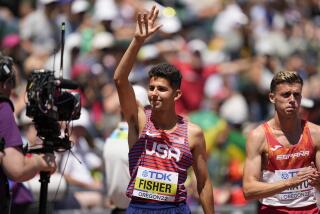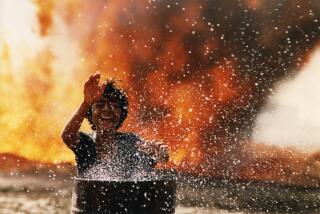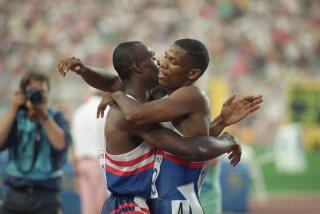FALL GUY
RABAT, Morocco — A small mosque stands at the outskirts of the city, beside the woods, its sparkling white minaret peeking above the treetops. Hicham El Guerrouj comes here for salah, to say prayers.
It is no secret what he prays for. In 75 days, this wisp of a young man will be favored to win the 1,500 meters at the Summer Olympics in Sydney, Australia.
Inshallah, as Muslims say. God willing.
Not that anyone expects otherwise. El Guerrouj has not lost at this distance in four years. He has won two world championships and broken--no, smashed--the record in the 1,500 as well as the 2,000 and the mile.
Experts marvel at his stride. Moroccan coaches speak of his dedication, the pain he endures in daily training. The international track and field federation ranks him as the top runner, of any kind, on the planet.
But as the Games draw near, the man himself sounds unsure. He emerges from services on a sultry afternoon, when the only other sign of life is a horse-drawn cart that lumbers past on the road, bearing a load of old car mufflers.
“As Muslims, we think differently,” he said. “I can train as hard as I want, but it is finally up to God.”
Inshallah, as Muslims say.
Such modesty from a runner who expects to someday hold every record from 1,500 to 5,000 meters. El Guerrouj persists in musing about disappointment in Sydney. He said: “There are other great athletes who never won a gold medal.”
Why is the best middle-distance runner in the world--many say the best ever--talking this way?
*
The mosque is part of a small training center, a running track and pale green buildings near the coast in this North African city. The dormitory has a cafeteria where a waiter brings couscous heaped with lamb, steamed carrots and garbanzos.
This Moroccan dish is eaten informally--everyone at the table grabs a spoon and digs into the same platter. Between mouthfuls, El Guerrouj tries to explain himself.
The story begins at the 1996 Games in Atlanta, where he was a newcomer facing the favorite, Algeria’s Noureddine Morceli.
“People were thinking Morceli was going to win,” El Guerrouj said in French, his coach and agent translating. “But I wanted to prove I was truly the best.”
The pack ran a tactical race for three laps and El Guerrouj recalled feeling strong, sitting on Morceli’s shoulder. He recalled the jostle of bodies. Maybe the congestion rattled him.
“I was young,” he said. “I should have waited.”
But with 400 meters remaining, El Guerrouj made an impatient move, too fast, too close. Somewhere in the jumble, a knee clipped a heel. Morceli stumbled and El Guerrouj went down in a heap.
The favorite recovered to win; the newcomer finished last. “It was the darkest day of my life,” El Guerrouj said.
It was especially tough for a young man who always expected greatness of himself.
Growing up in a middle-class family in Berkane, amid the orange groves of eastern Morocco, he started as a soccer goalkeeper, but his mother disapproved because he would come home dirty each day. She had to wash for seven children. At 14, El Guerrouj took up cross-country running.
Within a year, he was a national champion in his age group and caught the eye of track official Aziz Daouda.
“I told him that to reach a high level, he must have a certain way of life,” Daouda said. “I also told him that he must come with me.”
The boy moved to Rabat, about 250 miles from his home, placating his distraught mother by promising to one day eclipse Morocco’s national hero, Said Aouita, who won gold in the 5,000 at the 1984 Olympics in Los Angeles. The new prospect made a quick impression.
“He wanted to be perfect,” said Abdel Kada, his coach. “If he did not have a good training session, he would cry.”
About that time, Morceli was beginning a six-year reign as king of the mile. El Guerrouj carried a snapshot of the Algerian in his wallet, saying: “My goal always was to beat Morceli.”
In 1994, while still a teenager, El Guerrouj ran the 1,500 in an eye-opening 3:33.61 at Nice, France. The next year, he raced Morceli for the first time in the world championships at Gothenburg, Sweden. El Guerrouj finished second to Morceli but admits he was too scared to imagine outrunning his idol.
There were no such doubts in the summer of 1996. By then, the young Moroccan could think only of winning.
*
Even his name implies speed.
El Ger-oooosh.
Like a swift cartoon character. Like the rush of air as he starts his kick, passing the leader.
In Morocco, where runners qualify as a natural resource, he had big shoes to fill. Aouita and hurdler Nawal El Moutawakel won their nation’s first gold medals in Los Angeles, then Moulay Boutaib and Khalid Skah followed with 10,000-meter victories in Seoul and Barcelona.
So the Atlanta fall broke a streak. Weeping beneath the stands, El Guerrouj could not see past his disappointment.
Then came a cell phone call from Morocco, from the late King Hassan II, who told El Guerrouj he was a champion in the eyes of his people and must persevere. The runner said: “It was as if another El Guerrouj was born that moment.”
He went undefeated the rest of the season and defeated Morceli in the IAAF Grand Prix final at Milan, Italy, starting a new era in middle-distance running. A string of records fell:
* In July 1998, El Guerrouj set a new mark of 3:26 for the 1,500, leaving former record-holder Steve Cram of Britain to say: “This guy can take the world record into another dimension. . . . I’m only glad I’m not running now.”
* Last July, El Guerrouj broke Morceli’s record in the mile by a staggering 1.26 seconds, setting the new mark at 3:43.13.
* In September, he took a full three seconds off the 2,000-meter record, finishing in 4:44.79 in Berlin.
“We thought our greatest athlete was Said Aouita,” El Moutawakel said. “We thought we’d never have someone of his caliber again . . . then we got Hicham.”
While the records made him an icon, they also stirred rumors. El Guerrouj has heard whispers that he takes EPO, a endurance-enhancing drug for which no certified test exists. He shakes his head and says there are other reasons for his success.
First comes physiology. His 5-foot-9 body is oddly proportioned with a short, light torso propped on the legs of a taller man. He flows along the track, unnaturally smooth at great speed.
“Anybody who is close to the top of the world is a genetic freak,” said Craig Masback, chief executive officer of USA Track and Field and a 3:52 miler in his time.
Just as important is work ethic.
Daouda, the track official who also serves as El Guerrouj’s agent, tells of a recent day in Ifrane, a town in the Atlas Mountains where Moroccans train at altitude. The team had struggled through a dozen 500-meter runs and El Guerrouj wanted more.
“He always wants to do more,” said Kada, the coach. “For us, we have to stop him.”
It is the same in Rabat, where El Guerrouj leads an unusually devout life for a 25-year-old celebrity who earns millions of dollars each year from endorsements and appearance fees. He lives in a dormitory despite owning a nearby home. He prays five times a day. He also requires three teammates--including his younger brother, Fethi--to pace him through workouts.
On a typical afternoon, his coach puts him through a sequence of runs ranging from one kilometer to 200 meters. Then come five 400-meter sprints.
After dinner, El Guerrouj watches videotape of himself and his opponents, studying the tendencies of the two or three Kenyans most likely to challenge him in Sydney.
“He never takes it easy,” Kada said.
After all the victories, all the records, El Guerrouj acts like a man with something to prove.
“If I had won in Atlanta, maybe that would have finished my career,” he said. “Now it makes me work harder.”
*
His skinny face is all over Morocco. Those big eyes on billboards. That smile--with braces--in television commercials.
The people refer to him by first name in the same way Americans speak of Michael Jordan. Certainly Hee-shum will win the gold, says a shopkeeper in Casablanca. A taxi driver, speeding past the old city of Mohammedia, says Hicham must win for Morocco.
El Guerrouj feels the expectations of 30 million countrymen. He feels the weight of history.
“It has been four long years,” El Moutawakel said. “The only thing missing in his life is that gold medal.”
Maybe that is why El Guerrouj still keeps the snapshot of Morceli in his wallet. And a photograph from Atlanta prominently displayed in his dorm room.
The room is otherwise pleasant, dressed up with fine rugs and couches of red and gold. The walls are adorned with framed magazine covers that proclaim him “Track and Field Man of the Year” and “The Mile’s New King.”
But that photograph over the fireplace shows a boyish face twisted with sobs after the fall.
“I look at it every day,” he said. “Now it doesn’t hurt so much. But I remember.”
Maybe that is why El Guerrouj speaks of losing. He uses the memory to stay hungry, to run hard. Thoughts of defeat find their way into the mosque, a part of his daily prayers.
And that may be bad news for his opponents in Sydney.
“I want to do something historic in the Olympic Games,” El Guerrouj said. “That is what I am praying to God.”
(BEGIN TEXT OF INFOBOX / INFOGRAPHIC)
On a Moroccan Roll
Hicham El Guerrouj has dominated his events:
ALL-TIME 1,500-METER PERFORMANCE LIST
*--*
Time Name Country Year 3:26.00 Hicham El Guerrouj Morocco 1998 3:26.45 Hicham El Guerrouj Morocco 1998 3:27.37 Noureddine Morceli Algeria 1995 3:27.52 Noureddine Morceli Algeria 1995 3:27.65 Hicham El Guerrouj Morocco 1999 3:28.37 Noureddine Morceli Algeria 1995 3:28.37 Hicham El Guerrouj Morocco 1998 3:28.57 Hicham El Guerrouj Morocco 1999 3:28.73 Noah Ngeny Kenya 1999 3:28.84 Noah Ngeny Kenya 1999
*--*
ALL-TIME MILE PERFORMANCE LIST
*--*
3:43.13 Hicham El Guerrouj Morocco 1999 3:43.40 Noah Ngeny Kenya 1999 3:44.39 Noureddine Morceli Algeria 1993 3:44.60 Hicham El Guerrouj Morocco 1998 3:44.90 Hicham El Guerrouj Morocco 1997 3:45.19 Noureddine Morceli Algeria 1995 3:45.64 Hicham El Guerrouj Morocco 1997 3:46.32 Steve Cram Britain 1985 3:46.38 Daniel Komen Kenya 1997 3:46.70 Venuste Niyongabo Burundi 1997
*--*
ALL-TIME 2,000-METER PERFORMANCE LIST
*--*
4:44.79 Hicham El Guerrouj Morocco 1999 4:47.88 Noureddine Morceli Algeria 1995 4:48.36 Hicham El Guerrouj Morocco 1998 4:48.69 Venuste Niyongabo Burindi 1995 4:48.74 John Kibowen Kenya 1998
*--*
ALL-TIME 3000-METER PERFORMANCE LIST
*--*
7:20.67 Daniel Komen Kenya 1996 7:23.09 Hicham El Guerrouj Morocco 1999 7:25.09 Haile Gebrselassie Ethiopia 1998 7:25.11 Noureddine Morceli Algeria 1994 7:25.16 Daniel Komen Kenya 1996
*--*
More to Read
Go beyond the scoreboard
Get the latest on L.A.'s teams in the daily Sports Report newsletter.
You may occasionally receive promotional content from the Los Angeles Times.







